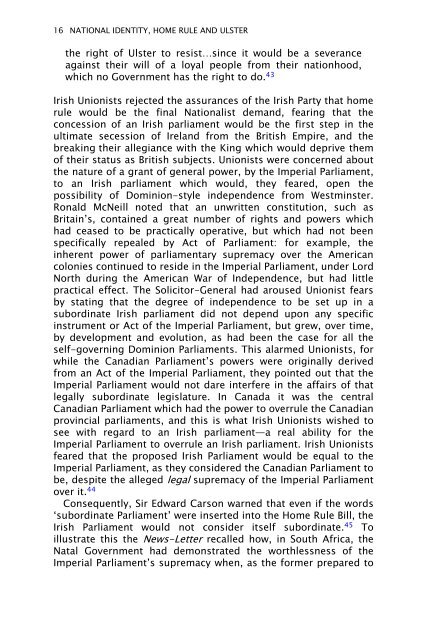Dividing Ireland: World War I and Partition
Dividing Ireland: World War I and Partition
Dividing Ireland: World War I and Partition
You also want an ePaper? Increase the reach of your titles
YUMPU automatically turns print PDFs into web optimized ePapers that Google loves.
16 NATIONAL IDENTITY, HOME RULE AND ULSTER<br />
the right of Ulster to resist…since it would be a severance<br />
against their will of a loyal people from their nationhood,<br />
which no Government has the right to do. 43<br />
Irish Unionists rejected the assurances of the Irish Party that home<br />
rule would be the final Nationalist dem<strong>and</strong>, fearing that the<br />
concession of an Irish parliament would be the first step in the<br />
ultimate secession of <strong>Irel<strong>and</strong></strong> from the British Empire, <strong>and</strong> the<br />
breaking their allegiance with the King which would deprive them<br />
of their status as British subjects. Unionists were concerned about<br />
the nature of a grant of general power, by the Imperial Parliament,<br />
to an Irish parliament which would, they feared, open the<br />
possibility of Dominion-style independence from Westminster.<br />
Ronald McNeill noted that an unwritten constitution, such as<br />
Britain’s, contained a great number of rights <strong>and</strong> powers which<br />
had ceased to be practically operative, but which had not been<br />
specifically repealed by Act of Parliament: for example, the<br />
inherent power of parliamentary supremacy over the American<br />
colonies continued to reside in the Imperial Parliament, under Lord<br />
North during the American <strong>War</strong> of Independence, but had little<br />
practical effect. The Solicitor-General had aroused Unionist fears<br />
by stating that the degree of independence to be set up in a<br />
subordinate Irish parliament did not depend upon any specific<br />
instrument or Act of the Imperial Parliament, but grew, over time,<br />
by development <strong>and</strong> evolution, as had been the case for all the<br />
self-governing Dominion Parliaments. This alarmed Unionists, for<br />
while the Canadian Parliament’s powers were originally derived<br />
from an Act of the Imperial Parliament, they pointed out that the<br />
Imperial Parliament would not dare interfere in the affairs of that<br />
legally subordinate legislature. In Canada it was the central<br />
Canadian Parliament which had the power to overrule the Canadian<br />
provincial parliaments, <strong>and</strong> this is what Irish Unionists wished to<br />
see with regard to an Irish parliament—a real ability for the<br />
Imperial Parliament to overrule an Irish parliament. Irish Unionists<br />
feared that the proposed Irish Parliament would be equal to the<br />
Imperial Parliament, as they considered the Canadian Parliament to<br />
be, despite the alleged legal supremacy of the Imperial Parliament<br />
over it. 44<br />
Consequently, Sir Edward Carson warned that even if the words<br />
‘subordinate Parliament’ were inserted into the Home Rule Bill, the<br />
Irish Parliament would not consider itself subordinate. 45 To<br />
illustrate this the News-Letter recalled how, in South Africa, the<br />
Natal Government had demonstrated the worthlessness of the<br />
Imperial Parliament’s supremacy when, as the former prepared to








